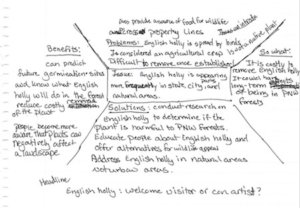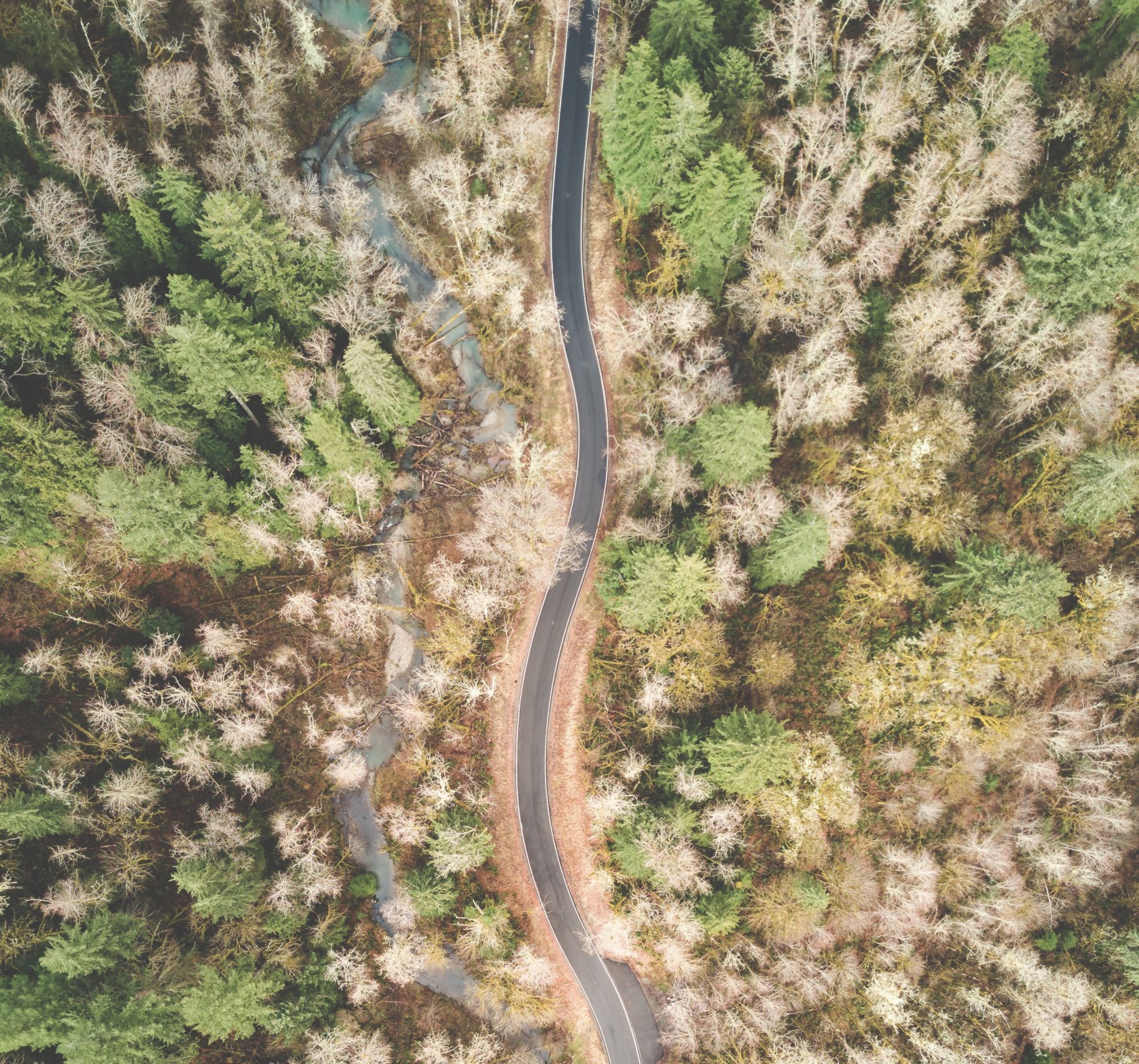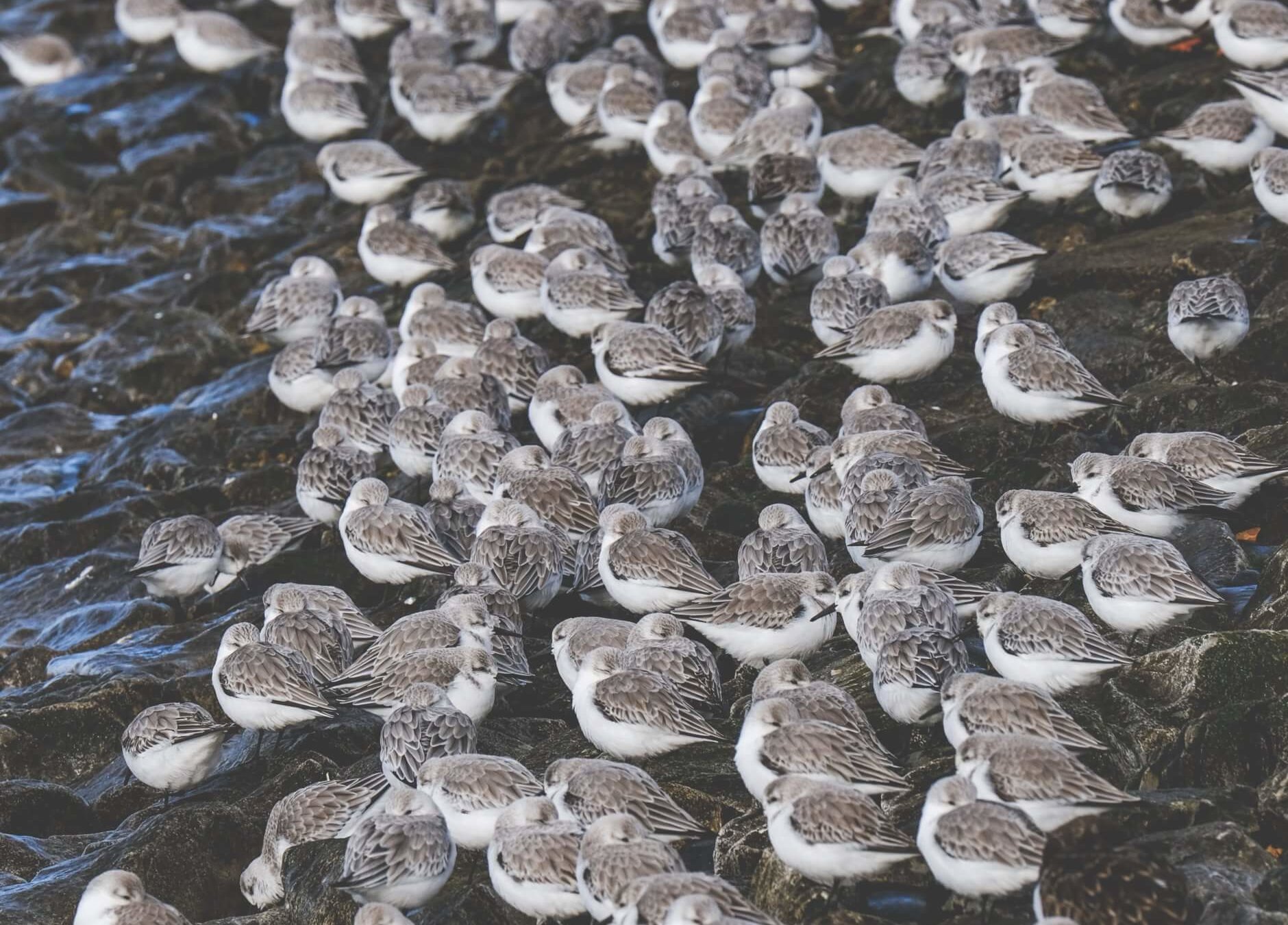Our executive director, Brooke Smith, was interviewed by Andrea Watts for the May 2016 issue of The Forestry Source, a publication by the Society of American Foresters. This wide-ranging Q&A shares some of our tips, insights on working with media, thoughts about science and advocacy, a bit of our history, and inspiration for starting to engage. This was particularly fun because Andrea had participated in a COMPASS training when she was a graduate student at the University of Washington – she still has her message box from that training, which we are excited to share here! Enjoy. This article was originally published in the May, 2016 issue of The Forestry Source. It is reposted here with the permission of the author.

The author’s Message Box from the University of Washington course, “Communicating Science to the Media.”
COMPASS Helps Scientists, Foresters with Communications
by Andrea Watts
For many scientists, communicating with the public about their work can seem as difficult, or more so, than the research itself. The same is true for many foresters and other natural-resource professionals who must explain the complexities of science-based forest management. I recently spoke with Brooke Smith, executive director of COMPASS, about breaking down barriers to such communications. COMPASS is a non-advocacy nonprofit with a mission to “see more scientists engage, and engage effectively, in the public discourse about the environment. Through communication trainings, coaching and real-world connections, we empower researchers to build the communication skills, networks, and relationships they need to realize this vision” (www.compassonline.org). Smith is also, coincidentally, married to an SAF member. What follows is an excerpt of our conversation.
Brooke, I was introduced to COMPASS through a graduate class at the University of Washington, “Communicating Science to the Media,” taught by Liz Neeley (former COMPASS staff). Because of this class and other science communication classes I had taken, I realized I would rather write about forestry than be a forester. This caused me to question my future career path, but fortunately my adviser, Eric Turnblom, said that we need people who can write about forestry, and his advice motivated me to pursue a career that combined my interests.
That’s good to hear; not a lot of people get that support from their advisers. I’ve heard some pretty bad stories from folks who realized while getting a science degree that they want to do writing or communication, and their adviser said, “No, we need people to do the science.”
What was the motivation for starting COMPASS, and why is it needed?
COMPASS started in 1999. We were specifically founded in the oceans realm and then expanded our scope to encompass environmental science. The motivation was the realization that there was a disconnect between what scientists were observing about how the world was changing and the implications of those changes with what the public understood about the environment and what policymakers were doing about it.
One of the reasons we felt the disconnect existed was because scientists weren’t doing an effective job of communicating what they knew beyond their peers and publications. Our core mission at COMPASS is to support scientists–to train them so they become more effective communicators and support them in getting out there and talking to both the press and policymakers–which, as you know, is not something that scientists are necessarily trained to do, nor are they rewarded to do.
Do scientists have the misconception that discussing the observed changes on the landscape is advocacy versus simply sharing research results? And if they do have this misconception, how did it come about?
I find that many scientists are reluctant to engage because they are concerned they will be pegged as advocates. And that this, in turn, will diminish their credibility. Engagement does not have to equal advocacy–if we’re talking about advocacy for specific policy solutions. What I think is critical for scientists to do, though, is think about advocacy before they engage–what does it mean for them and how comfortable are they with it.
I believe that whether a scientist chooses to advocate for a particular policy solution is a deeply personal choice. Scientists should think through how they want to show up and what their comfort level is before they engage. If a scientist shares observed changes about a landscape, they may get asked, “So, what do we do about it?” We always try to prepare scientists for this “what do I do about it” question; it can feel stressful in the moment. Scientists have options for how they answer this question–they can advocate for what to do, or they can respond with “tell me what you want to do, and I’ll share what I know about the benefits/consequences of that decision.”
We teach the value of the “if/then”–in other words, you could answer with “if you do this…then that…” as an alternative to “you should do this.” The key, though, is to think through how you want to respond before you are in that position.
What is the difference between advocacy and engaging with journalists to share research results?
Advocacy is a complex word. It means supporting a particular choice. Scientists can advocate for having science used in a decision, or they can advocate for what that specific decision is. I think scientists can be hesitant to engage, because they are concerned that this means they have to advocate for a policy outcome; while they can, they don’t have to. I hope that scientists explore this spectrum and their own comfort level, and that even it–especially if–a scientist doesn’t want to advocate for a policy outcome, they will still engage with journalists and others and share their insights.
What misconceptions do scientists have about communicating to the media?
I think a common misconception is that they’re going to be misquoted or misunderstood. What we find, and what scientist have experienced, is that often this doesn’t happen. Journalists are trying to get stories and get them right. It doesn’t do the journalist any good to get a story wrong. There’s a perception that you’re going to be misquoted or that you’re being used for an angle in the story, when that’s really truly not the case.
When scientists or foresters want to reach out to the media, what story ideas should they have in mind and how can they prepare for an interview?
We have a tool called the Message Box, which is a framework to think about what you want to communicate. The essence of a Message Box is about focusing more on why your science matters, or what we often say to scientists: “So what? What does that matter in the world?” The Message Box really helps reframe how you’re thinking about your science.
A couple other key pieces of advice we give is to start not with your results, but rather with why these results matter in the world. That’s a shift for scientists. You’re taught in your scientific training to lead with what questions you asked and how you approached your research. One of the things that we try to focus on is to start with your end in mind and share your bottom line or your “so what” first. This is often counterintuitive for scientists, since they tend to share that last.
The other thing that we often see as being really successful for scientists is to talk about why they were interested in researching a topic or doing the science. Bringing themselves into the story as a person is really powerful, but is counterintuitive for scientists, who are taught to write in the third person, not the first person. Trying to have the story be about yourself instead of your science is also a really powerful way of connecting with people and communicating your science.
And in forestry, there are so many great stories to tell about our work and research.
We always think of a story as defined by key elements: you need a character, a timeline, some sort of conflict, and a setting. Scientists tend not to describe those things, but the character could be you, an owl, a logger. There are some really powerful settings in forestry; don’t dismiss them. Bring people to the place you are working on and the subjects involved.
Is there any criticism that you receive about your saying that stories need a narrative, or that you’re suggesting that researchers simplify the science?
Making it accessible and simple is not the same as dumbing it down. We’ve found that once scientists practice their communication and get out there and do it, they’re not dumbing it down; they’re just talking about it in a different way.
What do you say to scientists who are reluctant to speak with journalists, believing journalists have a personal bias toward the issue and wouldn’t tell the story accurately? How can foresters feel they can trust a journalist to capture all sides of an issue?
A journalist talks to all the scientists they know who are experts in a particular issue–wildfire, for example. Here’s what we say to scientists: It’s not the journalists who didn’t do their job in finding you, you have the responsibility to reach out. Don’t pass the buck, don’t sit back. If you’re going to complain about what you see in the reporting, be a part of the solution.
We use that as a motivator; it’s not because journalists aren’t doing their job. It’s a two-way street, and if you reach out to them, you’ll make their job easier and it will be really helpful.
And once foresters or scientists engage with a journalist, they need to be able to trust him or her to accurately describe the issue, such as wildfire.
It’s okay to have a conversation with the journalist about a topic; ask them questions about it. Don’t always feel like you’re on the hot seat and it’s just a one-way interview. Some of the richness and nuance can come out of that conversation. One of the best pieces of advice we’ve given to scientists is that you can ask the journalist to repeat back to you what they heard. That’s okay–it helps you make sure that they got what you were trying to say. I think that’s always been an enlightening thing for scientists to hear. This can help you understand what they’re getting and where they’re coming from.
Do you find that journalists are willing to allow sources to review quotes? Or are they on a deadline and don’t have the time?
Most are on a deadline and need to turn their copy right away. And one of the things we hear from journalists about scientists reviewing quotes is that scientists are usually interested in rewriting the story besides their quotes. It’s the journalists’ job to tell the story, not the scientists’. So it’s about trust. It’s about trust in the journalist and trust in the conversation you had.
And like I said earlier, journalists don’t want to write a story that is wrong. They don’t want to go to their editor with a story that isn’t well-researched. Another piece of advice we give to scientists is that if something does come out and it’s wrong, it’s okay to call the journalist and talk to them about it, but don’t be defensive about it and don’t point fingers.
What do you think foresters need to think about when they are considering speaking to the media or public?
One really simple, easy piece of advice is the importance of staying away from jargon. This is a classic problem for anyone who works in the environment. Again, that comes back to keeping your audience in mind and knowing what they don’t know. It’s really important to talk in a language that means things to a more general audience and to avoid using acronyms.
With there being a need to communicate with the public, should graduate and undergraduate students take communication classes so they have these speaking skills in their toolbox?
I think that’s a fantastic suggestion. We have been trying to make sure that graduate students in the sciences are exposed to communication training, because it makes them a stronger scientist. Even if they don’t go into academia or become a scientist, it’s such a strong skill to be able to reframe how you’re talking about something or connecting with other audiences. We find there’s often a link between strong communicators and leadership.
Regardless of what field you’re going to go into and how far you’re going with a science degree, communications is a really great fundamental skill, just like managing a budget, but scientists often aren’t taught these things. There’s a number of core skills that just help you thrive and excel as a scientist or in any part of the workforce, and I believe communications is a really important one.



